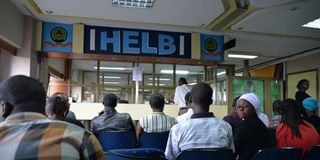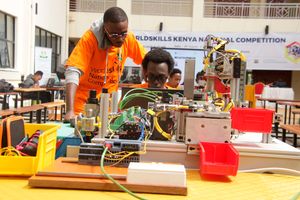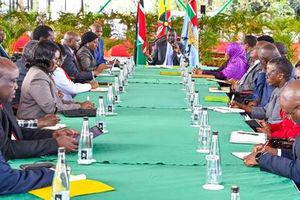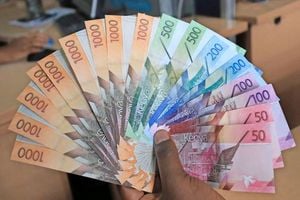
Students apply for Helb loans in Nairobi in September 2014.
Students and their families are being forced to choose university courses they can afford under the new funding model introduced last year rather than what they qualify for and aspire to study, investigations by Nation indicate.
First-year students, who were the first to use the model, have already accumulated fee balances and these are likely to rise as they progress.
The second cohort under the model is set to join in August and September this year and many students and parents have indicated that they will apply for inter-university transfers when the Kenya Universities and Colleges Central Placement Service (Kuccps) opens the system tomorrow.
Students who wish to change the courses they have been placed within the same university can also do so on the university portals.
Under the funding model, students are no longer guaranteed sponsorship by the government, but instead must apply every year and are financed according to their level of need as determined by the Universities Fund (UF) and the Higher Education Loans Board (Helb).
On Tuesday last week, President William Ruto met all public university vice-chancellors and one of the agenda items was evaluation of the funding model.
Students absorbed
“VCs confirmed it’s [the model] working and in the next three years, it will have improved status of public universities because all students will have been absorbed,” a brief message from State House read.
Students, however, tell a different story.
Last year, there was a delay in releasing the funds and students had to learn without money for upkeep. Some accumulated rent arrears while universities also operated without tuition fees.
Some 134,743 candidates have been placed in public universities this year. A total of 47,872 students who qualified for university admission after attaining a mean grade of C+ in the 2023 KCSE did not choose any degree course. Of these, 11,991 of them opted for diploma courses instead of degree courses, while the other 35,881 qualifiers are unaccounted for.
Joseph Raymond has always wanted to become a human resource manager. However, Raymond was forced to drop his dream course, Human Resource Management. The 19-year-old, mindful of financial constraints, had initially selected Maseno University due to its more affordable fees for the course (Sh183,600). However, he was disappointed to discover that he had been admitted to Kisii University instead, which is more expensive (Sh206,635).
“My mother, being a peasant farmer, cannot raise the required amount. Maseno University was my initial choice since I was aware of my family’s financial capability. However, the situation in Kisii leaves me uncertain about the future of my studies,” he says.
Raymond says that the prevailing circumstances have sent him back to the drawing board.
“From the look of things, I might just opt for a Bachelor of Arts in Economics with IT at Maseno University which costs Sh184,000 annually,” says the teenager.
Awarded a scholarship
Leonard Kanga, a first year student at Turkana University College is uncertain over completion of his studies after just one year.
When he travelled from his home in Elgeyo-Marakwet County last year and enrolled for a Bachelor of Education (physics and mathematics) degree at the institution, he was optimistic that the new higher education funding model would cater for his financial needs. Bachelor of Education is among the more “affordable” courses across various universities.
Kanga was classified under the less needy category and awarded a scholarship of Sh73,000 by UF and a Sh100,000 student loan from Helb. The annual fee for his programme is Sh244,000 and so his family was expected to raise Sh71,000.
“I received Sh45,000 from the Helb loan for my upkeep and the rest was paid directly as fees. I therefore have fee arrears of Sh116,000 after just one year. My poor parents were unable to clear my fees and I was thus denied a chance to sit my second semester exams,” Kanga said.
He says he luckily managed to sit the first semester examinations after local leaders, led by Governor Jeremiah Lomorukai, intervened following uproar from many students.
“I was forced to go to the village to engage in various income generating activities so that I can help my parents raise at least Sh50,000. We hope that the government will heed to our plea and increase the scholarship for the students from needy and less needy categories,” Kanga pleaded.
*Collins Omondi sat his KCSE examinations in 2022 and scored a mean grade of B- (minus). Had he enrolled at a university, he would probably be sitting his final first year examinations.
However, Omondi did not join any institution of higher learning last year as his parents asked him to delay his entry by one year to allow his sister to proceed to university first.
“Due to financial challenges, I wasn’t able to apply for placement under Kuccps. I tried to apply this year, but found myself being allowed [to apply for] diploma and certificate courses only but my wish is to study for a Bachelor of Education course,” he said.
2023 KCSE candidates
He reached out to Kuccps and was asked to write an application letter since placement through the portal only works for the current students, in this case, the 2023 KCSE candidates. He did as directed, but when the results were released, he had been left out and now fears he might miss the chance forever.
Although the cases might be unique, Raymond, Kanga and Omondi are among thousands of students who now have to factor in the cost of the degree courses they choose following the introduction of the higher education funding model last year. They are now forced to take courses they can afford rather than what they qualify for and aspire to study.
“Despite receiving 800 more students than last year, many programmes still have capacity for more students due to our enhanced declared capacities this year. Those wishing to join UoN can take advantage of the inter-university transfer window and apply for transfer,” University of Nairobi VC Prof Stephen Kiama Gitahi said on Monday, June 3.
He announced that the university will open its portal for inter-faculty and inter-programme transfers on August 11, 2024, one week before reporting on August 19, 2024.
However, in the 2024/25 budget proposals, Helb has a financing deficit of Sh11.4 billion, making it only able to fund all continuing students and only 17.2 per cent of the first-year students who will be joining university in August and September 2024, leaving others to their own devices.
The National Assembly Committee on Education is scheduled to have a meeting with the principal secretary for Higher Education Beatrice Inyangala to discuss the funding model.
Reporting by David Muchunguh, Sammy Lutta and Domnic Ombok









